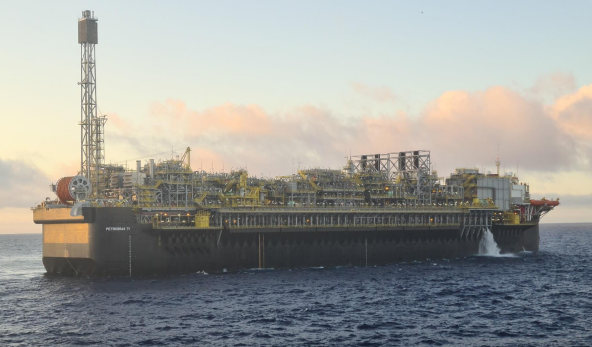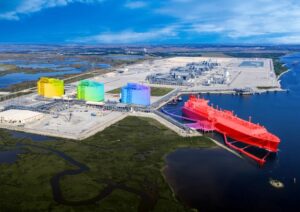
(Petrobras, 8.Feb.2023) — Petrobras commented on its production and sales in 4Q;22 and 2022.
“In 2022, we delivered an excellent operational performance, meeting all production targets for the year, with the following marks recorded:
In 2022, we achieved an annual record in operated production, with an average of 3.64 MMboed. This result was mainly due to the start-up of FPSO Guanabara (Mero field) and P-71 (Itapu field), as well as to the continuity of the ramp-ups of P-68 (Berbigão and Sururu fields), FPSO Carioca (Sepia field), and FPSO Guanabara, all located in the pre-salt of the Santos Basin. Another contributing factor was the start-up of new wells in Campos Basin.
The highlights of 2022 were:
- Start-up of FPSO Guanabara, the first definitive system in the Mero field, in Santos Basin pre-salt, on April 30. We currently have 4 production wells interconnected and reached, on January 11, the nominal capacity of 180,000 bpd, just 8 months after the first oil.
- Start-up of P-71 in the Itapu field, in Santos Basin pre-salt, on December 21. The FPSO start-up was scheduled for 2023 and was brought forward vis-à-vis the expectation on the 2022-26 Strategic Plan. The unit has an oil processing capacity of 150,000 bpd and is expected to reach the project’s nominal capacity in the second half of 2023.
“We ended 2022 with P-71 first oil earlier than expected, the sixth and last of the series of replicant platforms to come online, characterized by a standardized engineering design, with high production capacity and advanced technologies for operation and reduction of greenhouse gas emissions. This project brought us important lessons that prepare us for the challenges of the next units to come into operation”, stated the Director of Production Development, João Henrique Rittershaussen.
- Achievement of nominal production capacity on P-68, in the Berbigão and Sururu fields, in June 2022.
- Monthly production record by a pre-salt platform, set by FPSO Carioca, which reached average oil production of 174,000 bpd in November.
- Monthly oil production record in a single well in the pre-salt, reached by P-70 in November. In this month, well ATP-6 reached the historic mark of 56,500 bpd, confirming the high productivity of the Atapu field.
- Monthly and annual IUGA (Associated Gas Utilization Index) records, with respective marks of 98.0% achieved in October and 97.3% in 2022. These records make a significant contribution to emission reductions and greater carbon efficiency.
- Annual record in pre-salt own production, averaging 1.97 MMboed, representing 73% of Petrobras total production. This record was made possible, mainly, by ramp-ups and platforms that came online in the year. Our production in the pre-salt has been growing rapidly, and the record that was set represents an 83% increase compared to the volume we produced in this layer five years ago.
In 4Q22, the average production of oil, NGL and natural gas reached 2.65 MMboed, in line with 3Q22, mainly due to the ramp-up of FPSO Guanabara, the 10 days of production of P-71, and new wells in Campos Basin, effects that were partially offset by the higher volume of production reductions with maintenance and interventions; by the beginning of the decommissioning of platforms P-18, P-19, and P-20, as part of the Marlim field revitalization project; by divestments and by the assignment of 5% of the participation in the production sharing contract of the surplus volumes of the Transfer of Rights of the Búzios Field to CNOOC.
Total own production in the pre-salt, in 4Q22, was 1.98 MMboed, representing 75% of Petrobras total production. The total production operated by Petrobras, in turn, reached 3.70 MMboed in the quarter, 1.5% higher than the previous quarter, mainly due to the ramp-up of FPSO Guanabara and the start of production of P-71.
On November 25, FPSO Anna Nery arrived at the location in the Marlim Field. The Marlim 2 Revitalization FPSO will be the first unit of the revitalization project to start operating, with first oil planned for 1Q23. The second unit of the project planned to start operating, FPSO Anita Garibaldi, arrived on December 26 at Jurong Aracruz Shipyard (ES) for commissioning, inspections and final tests. The unit is scheduled to start operating in 2H23.
Also in 2023, we expect to start operations of FPSO Almirante Barroso, in 2Q23, and of FPSO Sepetiba, in 2H23. The FPSO Almirante Barroso, to be installed in the Búzios field, arrived at Brasfels Shipyard (RJ) on October 5 for the commissioning and acceptance test stages. Meanwhile, FPSO Sepetiba, to be installed in the Mero field, is undergoing integration and systems commissioning at BOMESC Tianjin shipyard, located in China.
On November 30, 2022, we concluded the assignment of 5% of Petrobras’ interest in the Production Sharing Agreement of the Surplus Volume of the Transfer of Rights of the Búzios field to our partner CNOOC Petroleum Brasil Ltda. The deal was made effective with the signature of the Amendment to the Production Sharing Contract by the Ministry of Mines and Energy.
The agreement derives from the option to purchase an additional portion, exercised by CPBL on 09/29/2021, in the amount of $1.9bn received by Petrobras on 11/24/2022. As of 12/01/2022, Petrobras will hold 85% stakes in the Production Sharing Contract for the Surplus Volume of the Onerous Assignment of the Búzios field, while CPBL will hold 10% and CNODC Brasil Petróleo e Gás Ltda (CNODC), 5%. The stakes in the Búzios Shared Reservoir, including the portions of the Transfer of Rights Agreement and the BS-500 Concession Agreement (100% Petrobras), will be 88.99% Petrobras, 7.34% CPBL and 3.67% CNODC.
As part of our portfolio management strategy, we highlight the main transactions in 4Q22:
- Conclusion of the sale of the shares of Paraná Xisto S.A which was created to hold the Shale Industrialization Unit (SIX), located in São Mateus do Sul, Paraná, to Forbes Resources Brazil Holding S.A. on November 4, 2022.
- Conclusion of the sale of the shares of Refinaria de Manaus S.A., which was created to hold the Refinaria Isaac Sabbá (REMAN), located in Manaus, Amazonas, to Ream Participações S.A. on November 30, whose 46 mbpd capacity corresponded to 2.4% of our total refining park in 2022.
- Conclusion of the sale of all our stakes in a set of 11 concessions of onshore oil and gas production fields, with integrated facilities, located in the state of Sergipe, referred to as Polo Carmópolis, to the company Carmo Energy S.A., on December 20, 2022.
- Conclusion of the sale of the totality of the stakes in the Papa-Terra production field, located in the Campos Basin, to the company 3R Petroleum Offshore S.A., on December 22, 2022.
The fields of Polo Carmópolis and Papa-Terra and the Shale Industrialization Unit (SIX) together had an average production of 9.5 kbpd of oil and 131,000 m3/day of gas, from January to November 2022.
The total utilization factor (FUT) of the refining facilities was 88% in 2022, 5 p.p. above 2021, with a 66% share of diesel, gasoline and jet fuel in total production, 1 p.p. above 2021. This FUT represents a high utilization of our refining facilities, even though there were relevant scheduled stoppages in six refineries: REPLAN, REVAP, REDUC, REGAP, REPAR and RPBC. We carried out maintenance on more than 2,000 large pieces of equipment, in compliance with safety, environmental, and health requirements.
In 2022, pre-salt oils represented 62% of the refinery’s throughput, setting a new record compared to the 59% processed in 2021. These streams yield high value oil products and have low sulfur content, contributing to emissions reductions.
In 2022, we will continue to develop the market for pre-salt streams with the aim of maximizing the value of Petrobras exports. In 4Q22, we carried out the first Mero export, opening a new market in Thailand.
Búzios continues to be the main export stream, accounting for almost 50% of the volume exported in 2022. The global market coverage allowed the best arbitrage throughout the year, which was marked by high volatility and changes in flows due to the war in Ukraine.
The sales of S-10 Diesel have been growing consistently, representing 59% of the total diesel sales in 2022, an increase of 3 p.p. when compared to 2021. The share of S-10 Diesel in the total diesel production has been following the market’s evolution, reaching 56% in 2022, a growth of 6 p.p. in relation to the previous year.
We set annual production records in 2022 for S-10 Diesel in the refining facilities as a whole (386 kbpd) and at REPLAN (97 kbpd), RPBC (52 kbpd), REGAP (42 kbpd), REFAP (41 kbpd) and REDUC (21 kbpd) refineries. Production records in 2022 were also set for gasoline at RPBC (51 kbpd) and REGAP (40 kbpd) refineries and for bunker at REPLAN (1,569 ktons) and LUBNOR (152 ktons).
In 2022, Petrobras’ asphalt sales exceeded 2021 results by 22%. In October, REFAP registered a production record of asphalt of 34 ktons, 19% higher than the monthly record of 2017 and, in November, a sales record of this oil product of 30,6 ktons, 36% higher than the volume sold in September 2016, the month of the previous record. REVAP achieved in November its best monthly result of asphalt delivery in the last 8 years.
The RefTOP (World Class Refining) Program achieved significant results throughout 2022, which leveraged the competitiveness of Petrobras refining facilities towards greater energy efficiency and emissions reduction. The refineries’ Greenhouse Gas Emissions Intensity (IGEE) continued to fall, from 39.7 kgCO2e/CWT in 2021 to 37.9 kgCO2e/CWT in 2022. The Energy Intensity decreased from 113.1 in 2021 to 107.5 in 2022. This contributed to a reduction in natural gas consumption of approximately 1 million m3/day in refining activities when compared to 2021.
In the refineries that are part of the RefTOP Program (RPBC, RECAP, REPLAN, REVAP and REDUC), the results were even more relevant. The IGEE fell from 38.2 kgCO2e/CWT in 2021 to 36.4 kgCO2e/CWT in 2022, while the IIE fell from 109.7 in 2021 to 105.4 in 2022.
These figures show that our emissions are falling as a result of the increasing efficiency of our operations. Also noteworthy is the start-up of new RefTOP investment projects, such as:
– new heat recovery exchangers in the Coking-I of REPLAN, reducing emissions by about 9 kt/y of CO2e and saving approximately 13 km³/day of natural gas;
– increase in heat recovery at REVAP’s Heat Recovery Boiler, with the potential to reduce emissions by about 30 kt/y of CO2e and saving approximately 40 km³/day of natural gas;
– REVAP’s Distillation top gas recovery system, reducing emissions by about 900 t/year of SOx;
– new feedstock dispersers for REDUC’s FCC, optimizing the production of gasoline and petrochemical products.
RefTOP’s portfolio comprises 148 new projects, with an associated investment of US$ 0.8 billion.
In 2022, we launched R5 Diesel in the market, with sales beginning in September, an initiative that is part of the BioRefining Program, which shall adequate our refining facilities for the low carbon transition. R5 Diesel is a fuel with 5% renewable content (of vegetable origin) in its composition, aimed at developing a new generation of products with lower carbon intensity and, therefore, lower Greenhouse Gas (GHG) emissions. The R5 Diesel showed reliability and good performance after six months of testing on a bus fleet in Curitiba (PR), proving its viability for large-scale marketing. Furthermore, in December, REPAR started the process for obtaining the international Sustainability Carbon & Certification (ISCC) for the renewable content of R Diesel. We plan to use co-processing for the production of R Diesel at the RPBC and REPLAN refineries, in São Paulo, and at REDUC, in Rio de Janeiro.
Regarding RPBC, we have planned in the 2023-27 Strategic Plan a facility entirely dedicated to the production of 100% renewable diesel and SAF. The new plant will have the capacity to produce 6,000 barrels per day of each product, in addition to green naphtha, a relevant input for the production of renewable plastics in the petrochemical segment.
We developed the CAP PRO Asphalt, a more efficient and sustainable product that can be used at significantly lower temperatures than usual, generating energy savings, and allowing a greater use of recycled asphalt material, allowing this oil product to have estimated carbon emissions up to 65% lower. The new product will be implemented throughout 2023, according to demand for roads renovation.
On December 31 we started the first fueling test of bunker with renewable content in a fleet ship, a mix of 90% volume of mineral bunker and 10% of biodiesel. The new fuel has the potential to reduce emissions of Greenhouse Gases (GHG) and the estimated percentage of reduction of CO2e emissions of this mixture is about 7%. The goal of the test is to evaluate the use of this bunker for two months and the logistics challenges associated. The pioneering ship was Darcy Ribeiro, a Transpetro vessel hired by Petrobras.
The very large crude carrier (VLCC) night undocking maneuver at the Angra dos Reis terminal was rated regular after it was concluded without any deviation related to the safety of the navigation performed. The Technical Committee of the Marine Pilots of Rio de Janeiro issued a favorable report for the maneuvers. This test, carried out in October, allowed an eight-hour reduction in the pier occupancy rate.
We promoted initiatives to expand our markets through the new integrated logistics operation for the outflow of green petroleum coke through Imbituba-SC, an action implemented to export the product produced at REPLAN. In addition, we opened a new gasoline sales hub in Rondonópolis-MT, which is part of the strategy to strengthen the company’s presence in the Midwest and, furthermore, we expanded our supply of bunker to third parties in Brazil with the resumption of its sale in Suape’s port, in early January 2023. Previously, it was restricted to Petrobras fleet vessels.”
____________________

